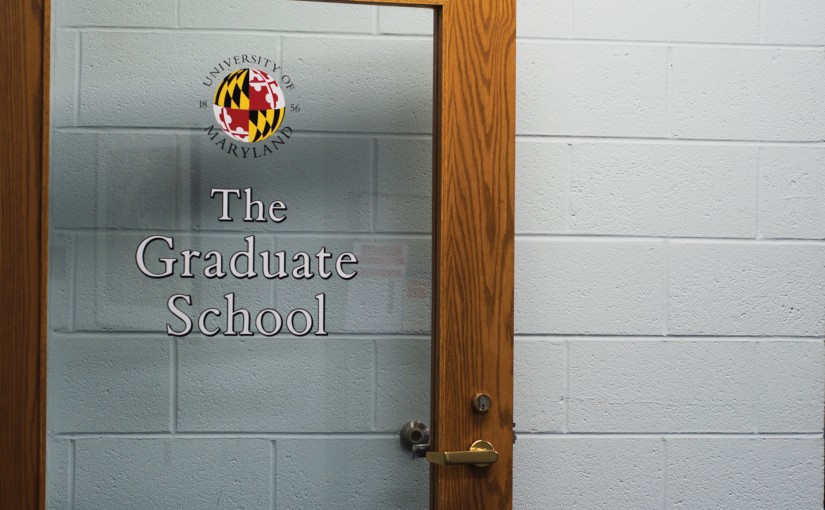All University of Maryland graduate assistants will receive a 2 percent increase in their stipend beginning in January 2019, the graduate school’s interim dean announced Tuesday.
These increases are due to a raise in cost of living, university spokesperson Jessica Jennings wrote in an email. Cost of living adjustments are set by Maryland state law and the University System of Maryland budget action and salary directives, according to this university’s human resources department’s website.
“After a careful assessment of the cost of attendance for graduate assistants, as well as productive discussions with graduate students across campus about their needs, we deemed that a significant increase in the minimum stipend was appropriate,” Interim Dean Steve Fetter wrote in a letter to graduate student leaders.
[Read more: A plan to increase grad students’ stipends is in the works at UMD, Loh says]
Faculty and staff will also receive a 2 percent increase in pay in January, Fetter wrote.
Since faculty and staff are also affected by this increase, Graduate Student Government Public Relations Vice President Katie Brown does not think it should be “framed as a raise given to [graduate assistants].”
“It’s great, don’t get me wrong, and we all need it, but it’s not the same thing as the grad school deciding ‘we’re not paying GA’s enough,'” Brown said.
The graduate school’s goal is to ultimately increase stipend levels by 12 percent, but will not be able to implement the increase all at once due to budget constraints, Fetter wrote.
In addition to the January increase, graduate Step I assistantships — which are assistants who are first-year students that do not hold a master’s degree — will see their minimum increase by 6 percent above the fiscal 2018 level starting in July 2018, Fetter wrote.
Minimum stipend levels for full assistantships in fiscal 2019 will be $16,212 for nine months, $17,113 for 9 1/2 months and $21,616 for 12 months. Departments, schools and colleges have the option of paying their graduate assistants more than the minimum stipend required by the graduate school.
This increase will only affect colleges or departments in this university that pay their graduate assistants the minimum stipend level, Jennings said. The minimum stipend level for a nine-and-a-half month assistantship is currently $16,144 per year, according to the graduate school’s website.
While Brown called this raise “long overdue, well-deserved and desperately needed,” for these workers, she said their biweekly paychecks will not increase much.
Fetter added that the graduate school intends to increase the minimum stipend level for Step I graduate assistants by an additional 4 percent in fiscal 2020, depending on fund availability.
University President Wallace Loh first mentioned a plan to increase stipend levels when he appeared on NPR on April 5. This was the first time graduate student leaders and labor activists from the Graduate Assistant Advisory Committee and the Fearless Student Coalition heard that a plan was in the works.
Fetter called graduate student leaders to notify them of the stipend increase on Thursday morning. While Fearless Student Employee Coalition member Morgan Hess, who was included on this call, said this was “very nice,” she was frustrated that graduate students were not involved sooner.
“None of us were in the room discussing this,” she said. “Even though this is good news, it’s yet another decision that’s handed down by the university to graduate students.”
Hess agreed that the minimum stipend level is still set too low, adding that it “still doesn’t account for the egregious cost of living in the surrounding area.” Monthly rent at the only designated graduate housing units at this university — Graduate Hills and Graduate Gardens — starts at $1,247, according to the apartment complex’s website.
“We understand the budget constraints,” Hess said. “But having a graduate student labor force that is diverse, that is competitive and that can afford to teach undergrads and produce research without having to feel like they’re being crushed by their finances is good for the university.”
[Read more: A UMD graduate assistant is struggling to live on $17,000 a year. And he’s not alone.]
The announcement comes after a bill that would have given collective bargaining rights to graduate student employees at public four-year universities failed to make it on to the State House or Senate floor in time for a vote before the legislative session ended on April 9. The rights would have enabled graduate assistants to negotiate contracts with employers.
Under the current system of meet-and-confer, graduate students and the graduate school debate job-related issues — such as wages — without structured agreement.
Fetter, who testified against the bill at its Senate hearing in February, said the graduate school “heard the concerns expressed by our graduate assistants, including the [GSG] and the [GAAC], and in testimony to the Maryland General Assembly, and took those into consideration while conducting our assessment of the appropriate increase to minimum stipends.”
Hess said she and other student activists will continue to push for collective bargaining rights and “real shared governance.”
“I think the university is starting to realize that graduate students, if they work together to exercise a collective voice, can be a force to be reckoned with,” she said.



